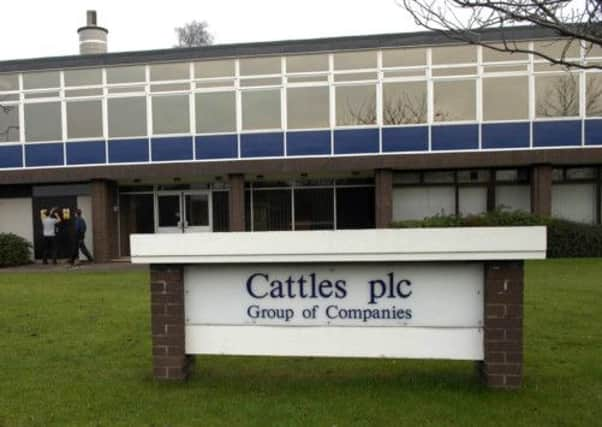Accountants took £84m in fees from lenders before they collapsed


The failure of the three Yorkshire institutions led to the loss of thousands of jobs in this region and in the case of Bradford & Bingley and HBOS triggered multi-billion pound taxpayer bailouts.
Bassetlaw Labour MP John Mann, a member of the Treasury Select Committee, described the fees as “ridiculously high” and questioned the quality of the audit work. He accused the accountancy firms of “nodding through” accounts.
Advertisement
Hide AdAdvertisement
Hide AdThe European Commission is considering sweeping reforms of the audit market and wants to increase competition in a sector dominated by KPMG, Deloitte, Ernst & Young and PwC. It may prevent firms from offering lucrative non-audit services to audit clients.
Commissioner Michel Barnier has slammed Big Four auditors as “the dog that did not bark during the crisis” for giving banks a clean bill of health just months before they had to be rescued.
This month a damning report by the Parliamentary Commission on Banking Standards found that two of Yorkshire’s most highly-paid bankers, Sir James Crosby and Andy Hornby, made a series of “toxic” misjudgments while in charge of HBOS which ultimately led to the bank’s downfall.
“We need robust accountancy,” said Mr Mann. “There’s a lack of competition in the sector in my view and that’s also part of the problem. The big players dominate and that excludes new entrants or growing firms and throughout the banking crisis we’ve seen the large accountancy firms give clean bills of heath repeatedly to banks with loan books that we all see now were demonstrably bad risk.”
Advertisement
Hide AdAdvertisement
Hide AdMr Mann claims a conflict of interest does exist in accountancy firms providing both audit and non-audit work, meaning that they “soft tread on problems that are there”, but PwC said that the proposed reforms would “reduce choice and damage audit quality”.
It said: “Auditors are already prohibited from providing many non-audit services – in general those which would conflict with the auditors’ role or would compromise impartiality and objectivity. Major prescriptive restrictions on non-audit services could reduce the number of audit firms able to tender for audit among some of Europe’s largest and most complex businesses.”
It said a total ban “could hamper important work, especially on closely-related matters such as tax compliance and transactions”. A final agreement by EU member states and the European Commission on the proposed reforms is expected by the end of the year.
Of the £84m in fees paid to accountancy firms by HBOS, Bradford & Bingley and Cattles from 2005-2009, around £37m was attributed to non-audit work, annual accounts show.
Advertisement
Hide AdAdvertisement
Hide AdAccountancy firms received £63.6m over the period from HBOS, including £21.7m of non-audit work. The majority went to KPMG until 2009 when PwC took over, with it receiving £12.9m in that year, with £2.1m of non-audit work. Meanwhile, KPMG was paid £8.8m over the five years by Bradford & Bingley, including around £5.7m for non-audit work. Santander took over Bradford & Bingley’s savings accounts and branches, and the Government took control of its mortgages and loans, following the bank’s collapse in 2008 due to massive bad debts.
Cattles was charged £11.8m by its auditors over the period, of which around £9.5m was for non-audit work. PwC was asked to resign as auditor of Cattles in 2009 with Grant Thornton taking over. In the 2008 accounts, Cattles paid both PwC and Grant Thornton, with total auditor’ fees amounting to £6.6m. KPMG is facing a potential investigation by the Financial Reporting Council over its auditing of HBOS ahead of its demise, but KPMG has said it stands by the quality of its audit work at the bank. It declined to comment further yesterday.
HBOS buckled under the weight of its debts at the start of 2009, eight years after the bank was formed in a merger between Yorkshire’s demutualised Halifax plc and the Bank of Scotland. Taxpayers were forced to bail it out, and it became part of the Lloyds group in a hasty Government-arranged takeover.
Cattles is suing PwC in the High Court, claiming its former auditor was negligent and massively mis-stated its finances.
Advertisement
Hide AdAdvertisement
Hide AdBatley-based sub-prime lender Cattles was felled by a long-running accountancy scandal which surfaced in early 2009 after warnings from a whistleblower. It is now being wound down.
PwC described the claim as “inflated” and “misguided”, adding that it will defend its work. It said: “We are disappointed that this claim has been issued given the FSA’s censure of the company for market abuse as well as the FSA’s conclusion that certain directors of Cattles plc were found to have acted without integrity in discharging their responsibilities.”
Will Oxley, practice leader at Grant Thornton in Leeds, said the firm “welcomes regulatory change in the external audit marketplace”.
Grant Thornton said that it was appointed as auditor to the Cattles group, following the announcement of its difficulties.